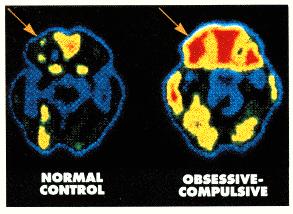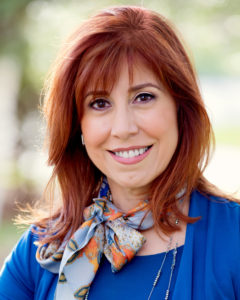
Just because it feels natural…doesn’t mean it’s good for you
Macie is a 32 year-old administrative assistant who feels growing tension when she leaves the house. She opens and closes the door, locks it then unlocks it, and opens and closes it again to be sure it’s latched. Then locks it… and unlocks it. It doesn’t feel secure yet. So she repeats this ritual five times. For some reason, after the fifth cycle, she can finally leave. So she does.
She gets in the car, puts her key in the ignition, and starts it up. Then she turns it off, takes her key out, then reinserts it, and starts it up again. After three cycles, she’s ready to back her car out of the driveway.
These behavior patterns of repetitious cycles follow her through her day. For instance, when she goes to the restroom at work, she washes her hands, rinses them, and examines them. But they don’t feel very clean and the idea of the germs that are probably still there makes her shudder… so she sticks her hands back under the water, soaps them up, rubs them together and wrings them, rinses them, and turns off the water.
Nope…not there yet. It takes at least 3 more cycles like this before she can dry her hands and leave the restroom. She uses a paper towel to turn the doorknob.
People can be cruel.
Macie didn’t think much about these rituals until someone commented…someone else laughed… then became impatient waiting for all this to be completed. The comments of others began to wear on her…and she started to realize that maybe she was different than the others around her. And she felt ashamed.
She isn’t the fastest worker in her office, because of all these cycles that slow her down. But she has an eye for detail…and is great with spreadsheets. Meticulous, careful, accurate.
Her husband, Josh, learned long ago to be patient and tolerant. It didn’t take long for him to realize that pushing her, pressuring her to hurry up and get moving, only resulted in her anxiety shooting up, her tension doubling, and then . . . instead of 5 cycles to lock the door, she needed 12, and instead of 3 hand washings, she needed 9.
In short, heightened anxiety just made everything harder … and worse.
Why do some people act this way…?
Macie has Obsessive Compulsive Disorder, and only recently she realized it’s affecting her job, and her friendships.
Obsessive Compulsive Disorder is a combination of recurring, intrusive, unwanted or disturbing thoughts or ideas that cause a person to feel unsettled and distressed. Then, to relieve the misery they feel, they’re driven to perform a repetitive action. Behaviors like these — such as Macie’s hand washing or checking the door locks — tend to interfere with their daily functioning to a dramatic degree.
Now we’re not talking about someone who locks the door twice and goes on his way. The rituals referred to here are so numerous and compelling that people like Macie have a difficult time maintaining a job, or maintaining relationships, because of them. The pressure to keep going through the cycle until it feels right is so great that if the cycle is disrupted, it causes terrible stress and consternation.
You know that feeling you have when you’re on a road trip and the second day you can’t remember if you left food and water for the cat…? You don’t want to go back and start your trip over, but you also don’t want your cat to starve. It’s so troubling, and anxiety builds until you resolve the situation.
Well, multiply that distress by about 50, and you’ll have a glimpse of the distress Macie feels about failing to lock that door. Then imagine this happening all day long.
OCD is like having a huge nasty bully in your head
…that no one else can see
In Macie’s case, she knows in the back of her mind that the fears she has aren’t real…but logically knowing it doesn’t ease her distress. Because this is not a logical problem. It’s rooted in anxiety that doesn’t go away. Anxiety she doesn’t understand, and can’t explain away. So she continues with her routines as if they’re just part of everyday life. Every day.
For her…they actually are.
In many cases, someone with OCD doesn’t seek treatment until they’re fired from their job or lose a relationship with someone who ran out of patience. When sorrow mounts that’s caused by their OCD behaviors, they get ready to seek help.

Is OCD common?
About 1.2% of adults suffers from OCD, which can begin in childhood, adolescence, or adulthood. If you have parents or close family members with OCD, the risk of developing it is higher for you.
Also, if you have another psychiatric disorder, that also may increase your risk of developing this one, too.
And then there’s trauma. When a terrifying or profoundly distressing experience presents itself, it draws a reaction from you. Your reaction may be fear of it happening again, or disgust at the thought of it, or some other disturbing feeling. For some people after an experience like this, a pattern of coping goes into play. To keep the thought of it out of your mind, you do something that’s reassuring or distracting. The disturbing thought is often connected to the repetitive action.
- Fear of sickness from germs or chemicals => may result in feeling driven to clean incessantly, repetitively washing and washing your hands…even being afraid to touch people or objects others have touched.
- Fear of an intruder => may result in repetitive cycles of door locking and re-locking
- Fear of hitting someone with the car => may trigger the need to back up at stop signs, or pull off the road to check, or call the local hospitals
The point is that these distressing thoughts can compel the person who’s suffering to perform certain rituals, and those rituals can interfere with normal functioning in a productive life. In fact, they can be debilitating.
Is there treatment?
Yes, there are medications that bring relief in some cases. But of the patients who take medications, 40-60% receive partial relief or none at all. There are therapies like CBT and exposure therapy that sometimes help to ease the disturbing and intrusive thoughts, as well as the compulsions. But these treatments leave only about 10% of people with OCD successfully treated.
Which calls for innovative treatments.
Obsessive Compulsive Disorder Treatments
For this reason, we offer other options, like Transcranial Magnetic Stimulation, for patients who haven’t experienced relief from Obsessive Compulsive Disorder through medication and therapy. TMS is not systemic, so there are none of the side effects like you may experience with antidepressants.
IV Ketamine also shows great promise and success in treating OCD. Like TMS, IV Ketamine is a treatment that targets brain structures to bring relief to OCD symptoms.
Obsessive Compulsive Disorder treatments change the game.
We can learn more about what you need to feel better… LIVE better….through a thorough psychiatric evaluation. If  you’ve suffered with the harrowing symptoms of OCD and have not experienced relief from the medications you’re taking, let us help match you to the solution best suited to you.
you’ve suffered with the harrowing symptoms of OCD and have not experienced relief from the medications you’re taking, let us help match you to the solution best suited to you.
Helping you to find the life you ache to live is our highest, never-ending goal. Let’s join forces to find your solutions.
To the emerging of your best self,
Lori Calabrese, M.D.

I am glad that you come up with this kind of article. I appreciate this a lot and I found it very informative and worth reading. Thanks for posting.